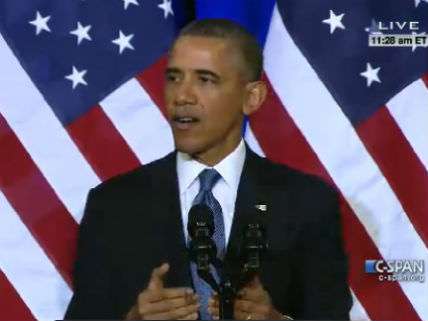Obama Suddenly Realizes Mass Surveillance Threatens Privacy

During his speech on the National Security Agency's surveillance programs today, President Obama trotted out the familiar claim that mass collection of Americans' phone records could have prevented 9/11:
The program grew out of a desire to address a gap identified after 9/11. One of the 9/11 hijackers—Khalid al-Mihdhar—made a phone call from San Diego to a known al Qaeda safe-house in Yemen. NSA saw that call, but could not see that it was coming from an individual already in the United States. The telephone metadata program under Section 215 was designed to map the communications of terrorists, so we can see who they may be in contact with as quickly as possible.
As ProPublica's Justin Elliott pointed out last June, "U.S. intelligence agencies knew the identity of the hijacker in question, Saudi national Khalid al Mihdhar, long before 9/11 and had the ability [to] find him, but they failed to do so." Furthermore, it is not clear why the NSA, having eavesdropped on seven calls between al-Mihdhar and the Al Qaeda safe house in Yemen, needed a database containing everyone's phone records to identify the source of those calls. The Justice Department "could have asked the FISA Court for a warrant to all phone companies to show all calls from the U.S. which went to the Yemen number," former counterterrorism official Richard Clarke told ProPublica. "Since they had one end of the calls (the Yemen number), all they had to do was ask for any call connecting to it."
It is telling that the administration cannot cite any examples better than this weak counterfactual to illustrate the supposed necessity of the NSA's phone-record dragnet. As ProPublica's Kara Brandeisky notes, "Obama's own review group concluded that the sweeping phone records collection program has not prevented any terrorist attacks."
The reforms Obama announced today confirm that the program's utility has been greatly exaggerated:
I am therefore ordering a transition that will end the Section 215 bulk metadata program as it currently exists, and establish a mechanism that preserves the capabilities we need without the government holding this bulk metadata….
Effective immediately, we will only pursue phone calls that are two steps removed from a number associated with a terrorist organization instead of three. And I have directed the Attorney General to work with the Foreign Intelligence Surveillance Court so that during this transition period, the database can be queried only after a judicial finding, or in a true emergency.
If such safeguards pose no threat to national security, why is Obama acting only now? Because as long as the program was secret, he did not recognize the privacy threat it posed. But now that it has been revealed by a leak that Obama condemns, he realizes that "without proper safeguards, this type of program could be used to yield more information about our private lives and open the door to more intrusive bulk collection programs." He also suddenly is troubled by the fact that the program "has never been subject to vigorous public debate," although his administration did everything in its power to prevent such a debate.
The other reforms that Obama announced today—such as "a panel of advocates from outside government to provide an independent voice in significant cases before the Foreign Intelligence Surveillance Court" and "additional restrictions on government's ability to retain, search, and use in criminal cases communications between Americans and foreign citizens"—likewise could have been implemented at any point between January 2009 and now. Since Obama insists that "I maintained a healthy skepticism toward our surveillance programs after I became president," it's strange that he waited so long, isn't it?
Obama cannot have it both ways. Either the government's mass collection of every American's telephone records is essential to national security, or it isn't. Either the surveillance activities that ignited public outrage when they were revealed last June amount to nothing more than a "modest encroachment" that "the American people should feel comfortable about," as Obama claimed at the time, or they pose substantial threats to privacy that need to be mitigated, as he indicated today. Either the reforms he announced will protect Americans from indiscriminate snooping, or they are mere window dressing aimed at "giv[ing] the American people greater confidence that their rights are being protected" (as he put it today) without actually protecting those rights.
Obama did manage to utter at least one important truth:
Given the unique power of the state, it is not enough for leaders to say: trust us, we won't abuse the data we collect. For history has seen too many examples when that trust has been breached. Our system of government is built on the premise that our liberty cannot depend on the good intentions of those in power; it depends upon the law to constrain those in power.
I believe this, but I do not believe that Obama does.


Show Comments (137)